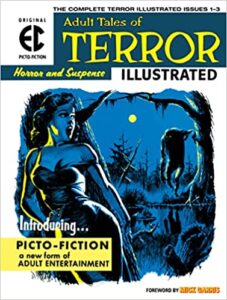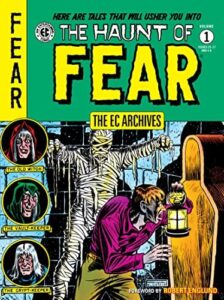The EC Archives: Terror Illustrated edited by Daniel Chabon, original series editor William M. Gaines
Dark Horse, 2022
ISBN-13: 9781506719788
Available: Kindle edition, hardcover ( Bookshop.org | Amazon.com )
The EC Archives: Terror Illustrated includes illustrated prose stories of terror, murder, and the supernatural with works by Al Feldstein (also writing under Alfred E. Neuman), Jack Davis, Joe Orlando, Johnny Craig, and more! This collection also features the never printed third issue, and a foreword by Mick Garris. The book, advertised as “Picto-Fiction,” contains illustrated stories rather than a traditional comic.
I’m going to start out this review with the negative. There are some problematic stories in this volume, the worst of them being “Mother Love” by Maxwell Williams and illustrated by Charles Sultan, and “The Long Wait” by Alfred E. Neuman and illustrated by Johnny Craig. In “Mother Love,” Leona’s father sells her to a brute named Clint as a bride. She is endlessly abused and tormented, and rape is alluded to in this story. She is described as no smarter than a toddler, and lines like “Not that Leona thought of her life as a horror. Her mind was not capable of that” made this hard to get through. It gets worse. Clint discovers she is pregnant, and after he beats and abuses her further, he devises a plan where he would abandon her at the hospital. I don’t often ruin the end of the story in my reviews, but I will here. She eventually escapes the hospital and returns to the cabin, with her stillborn baby in a jar, and kills Clint. When the police arrive, nothing is done to try to figure out why what happened, happened. An abused woman is arrested for killing her abuser. This story is problematic on so many levels.
In “The Long Wait” by Alfred E. Neuman, illustrated by Johnny Craig, Red Buckley murders his boss, plantation owner Emil Duval. As can be expected when a plantation is mentioned, you can bet there are racist depictions of Black “workers” Kulu approaches the main house and says “Kulu wanna be house-boy. Kulu wanna be servant.” Yikes. You think Buckley gets his comeuppance in the end…but it still reveals a racially insensitive reason that it occurs.
This is not to say there are not some gems in this volume. There are some good stories here. The first story in issue 1, “The Sucker”, by Maxwell Williams and illustrated by Reed Crandall, is told in second person: you are on the run when you meet a beautiful dame who cheats and robs you, and the only thing you can do every night is kill her…again…and again…and again. In “Halloween”, by Alfred Feldstein and illustrated by Reed Crandall, Ann Dennis is hired as the matron of Briarwood Orphan Asylum by the headmaster, Eban Critchet. She does her best to improve the lives of the orphans in her care, but when she discovers what the headmaster has been doing, she takes matters into her own hands, and the children aren’t far behind. “The Gorilla’s Paw”, by Alfred E. Neuman and illustrated by Johnny Craig is a violent and brutal retelling of the classic “Monkey’s Paw” tale. After a man is convinced he must purchase a mummified gorilla’s paw from a curio shop, he is plagued by nightmares and wishes he had never bought it, then awakens to find the paw holding the amount of money he paid for the paw. When he discovers the secret of the paw, he keeps on wishing, and his last wish proves to be a doozy. “Keepsake” by Jack Oleck, illustrated by Graham Ingels, gives us the story of an undertaker mourning the death of his childhood friend and unrequited love, Miss Hettie. During his time as undertaker, he kept a deadly secret for her, and after he discovers another one of her little secrets, he will be able to keep another. A fun inclusion in the third issue is the “Letters to the Editor” column the best one that denounces the magazine as “the highest and most advanced form of Brainrot on the market today” and “the stories and thoughts that these magazines contain are truly the work of Satan.”
This volume provides a glimpse into the horror enjoyed in the 1950s and echoes the radio plays such as Suspense, The Mysterious Traveler, Inner Sanctum, and others. Despite the problematic elements of some of the stories, I still found enjoyable tales of terror within these pages, and the artwork was well done. This book, along with other EC Comics archival editions, would be an interesting addition for comics history, as well as courses studying comics and graphic novels. Recommended.
Reviewed by Lizzy Walker







Follow Us!